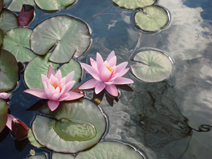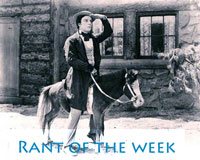
More on
Junk Forensic "Science".
When I was very young, my brother came into
our house one day and told me he needed help. He led me to the back of
the garage where he had started a fire which was now beginning to lick up
the exterior wall. He wanted me to help him put it out. We began
filling small plastic buckets with sand from the sand box and throwing it on
the wall. In spite of our efforts, the flames grew bigger and bigger,
and I believe I was about to tell him we should get real help when I noticed
he had disappeared. He had gone back into the house to tell our mom
that I had started a fire behind the garage.
I denied it, of course.
My mom stared at me and ask me if I was telling the truth. Everybody knows that
if you are telling the truth, you won't get nervous and giggle. I giggled.
Busted.
Or maybe I wasn't. I had a feeling that Mom wasn't totally
convinced. I don't remember any big punishment other than having to
stay in my room for a while.
We now know, I hope, that people giggle when they are nervous,
whether they are lying or not. It was the bite mark of my childhood, a
wrongful conviction based on spurious evidence. You might think it
trivial, but I have never forgotten. I few years ago, I brought it up
at a family party and my brother acknowledged that he, in fact, had started
the fire. Within a year, the entire family seemed to forget that
revelation and went right back to blaming me for it.
, and even to this day my siblings tend
to remember that I started that fire rather than the fact that Ed finally
admitted the truth years ago.

2012-04-19
Remember Damien Echols? Bite evidence was also introduced as his
trials.
My own take on the
Caylee
Anthony case? I doubt we'll ever know the truth. Casey
Anthony is clearly a disturbed, unstable, delusional young woman, but that
doesn't necessarily mean she is also a murderess. She could
be. But we've seen enough wrongful convictions to know that people
tend to fit the facts to the preferred narrative, not the other way around,
and whacky, unstable people are particularly vulnerable.
Here's the most compelling point in her favor: if the police and prosecutors
really believed she was guilty, why on earth did they introduce so much
whacky junk forensic science into the proceedings? If you were a
prosecutor, wouldn't you have dumped the "smell" science immediately as
something that looked specious and stupid, and would ultimately weaken your
case? If you really believed in your own case, with any kind of
integrity or intelligence, why would you introduce so many dubious elements
into your presentation?
The answer is that prosecutors and police believe that the court system is a
bit of a game, and you do what it takes to win, and getting at the truth is
merely a secondary objective. I think they see a kind of organic logic
to the system, justice theatre, in which their goal is to lock up bad people
when something bad happens. If a few innocent people get snagged along
the way, so be it.
.... and if a particular suspect didn't commit a particular crime but was
busted for it anyway-- it's a small price to pay for a system
which, they believe, ultimately "works".
Index

If you were charged with a crime in the U.S.
and put on trial, would you assume that the forensic evidence introduced in
court against you would at least be based on some kind of sound, factual,
scientific research? Think again.
Frontline recently ran a
documentary on the "science" of fingerprinting, bite mark analysis, and
other forensic "sciences" and demonstrated rather convincingly that many
courts will allow testimony by self-styled experts that has no basis in any
substantive research whatsoever.
The most dramatic examples were related
to two men who had been in prison for ten years or more for assaulting and
murdering three-year-old girls. In both cases, the men were the former
boyfriends of the girls' mother. In both cases, an orthodontist who
claimed to be versed in the science of bite mark analysis testified that
scratches on the little girls' bodies were actually bite marks that could
only have come from the suspects, to the exclusion of everyone else.
In each case, this testimony was the bulwark of the prosecution's argument.
In each case, the judge allowed the testimony. In each case, the man
was convicted. In each case, DNA analysis-- which is founded in real
science-- eventually exonerated the men, and the real killer confessed to
the crimes.
Do I have to be polite when expressing myself about how I feel
about these judges for allowing this testimony into their courts?
This is not a matter upon which reasonable, educated people might
respectfully beg to differ. These are witch trials that have no place
in a civil society.
How far does it go? At the Casey Anthony trial a
self-styled expert in smells testified that a container of smell-- I'm not
making this up-- from the trunk of Casey Anthony's car contained the smell
of a dead body. Casey Anthony was found not guilty largely because she
was able to raise $200,000 for decent lawyers by selling pictures of her
with Caylee to People Magazine. Those lawyers successfully challenged
a host of junk science evidence.
Now, there are rules about "expert"
testimony. Prosecutors interviewed by Frontline didn't seem aware of
them. One of them declared that it was up to the jury to determine
whether the smell evidence was truthful, relevant, or accurate. It is
not. The Supreme
Court has ruled that the judge is the "gatekeeper" for expert testimony
and determines whether any specific evidence should be presented or not.
Furthermore, evidence will be deemed qualified if it has been gathered
according to a scientific methodology which makes use of valid scientific
procedures. One key element is falsifiability.
That said, some judges will permit both sides to present evidence on the
scientific validity of certain procedures and expect the jury to sort it
out. This gives an enormous advantage to the heavily resourced
prosecution in most cases.


